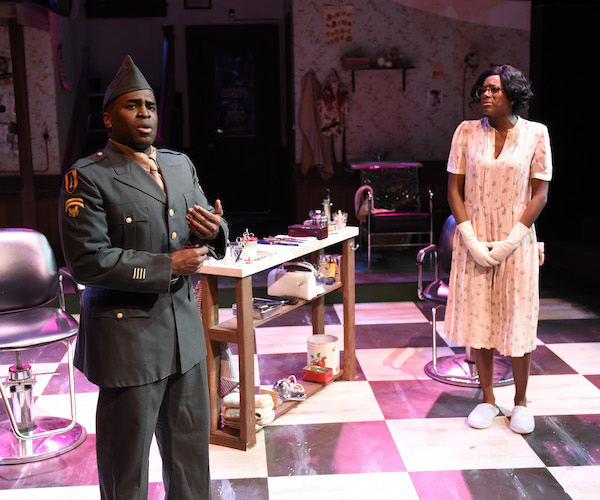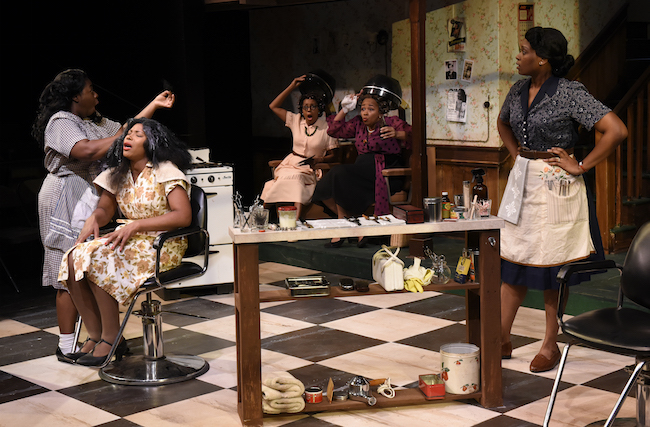Theater Review: “Saturday Night/Sunday Morning”—As Expected as the Sunrise
Dramatist Katori Hall’s narrative unfolds with few surprises: every revelation, every secret, every comeuppance, whether comic or tragic, is foreshadowed—often heavy-handedly.
Saturday Night/Sunday Morning by Katori Hall. Directed by Dawn M. Simmons. Presented by the Lyric Stage Company of Boston, Boston, MA, through November 21.

Omar Robinson and Tasia A Jones in the Lyric Stage Production of “Saturday Night/Sunday Morning.” Photo: Glenn Perry.
By Ian Thal
Miss Mary (Jasmine Rush) is an independent businesswoman in Memphis, Tennessee’s African American community. She owns her own house, which was left to her by her husband, an early casualty of the United States’ involvement in World War II. She runs a beauty shop—Miss Mary’s Press n’ Curl—from the first floor of her home. She has made peace with being on her own, but in that she is an exception. Saturday Night/Sunday Morning takes place in the last months of World War II, shortly after Adolf Hitler’s suicide on April 30, 1945, and the play ends shortly after the August 15 announcement of Imperial Japan’s unconditional surrender. It was a time of shortages in America—and for the women who live upstairs in the rooms Miss Mary rents, what’s missed most are able-bodied men, who are far away and in uniform.
One of Miss Mary’s boarders, Leanne (Jade Guerra), is the classic melancholic narcissist. She makes every effort to appear glamorous as she pines in her lavender satin dressing gown for the love of her life, Bobby (Omar Robinson)—a young man who shipped out nearly four years ago. Mabel (Cloteal L. Horne) and Taffy (Meagan Dilworth) are two sisters from Chattanooga who work part time in the beauty shop. Mabel, the older and more conventionally attractive sister, is married to Bobby’s brother Joe, who is also serving in the army. She deals with her feelings of abandonment by way of clandestine liaisons with the men deemed unfit to serve in combat. Taffy, the younger sister, works a second job at the button factory, and just hopes that Buzz (Keith Mascoll) the postman will notice her. Buzz’s childhood bout with polio left him with a limp that allows him to enjoy life on the homefront, using his rounds as a letter carrier as the means for a second revenue stream as a door-to-door salesman (not surprisingly, the character plays the comedic function of both professions to the hilt).
Gladys (Tasia A. Jones), a deacon’s daughter, arrives from Birmingham, Alabama. Unlike the other women, she is literate; well versed not only in the Bible but in current literature and the news. Gladys aspires to be a writer, and even owns a travel typewriter—literally the ’40s equivalent of a laptop. Soon, Leanne adopts Gladys as her roommate/sidekick. The sisters from Chattanooga, exasperated by Leanne’s perpetual sulking, enlist Gladys into ghostwriting letters in Bobby’s name. And after the first one arrives, Gladys is soon writing letters back to the imaginary Bobby at Leanne’s behest.
At first glance, playwright Katori Hall has populated her script with comic archetypes. But as the play moves along she introduces elements of serious drama. The actions and attitudes taken by her characters may be amusing, but they also have painful consequences—wishful thinking is routinely dashed by an indifferent reality.
The catch is that Hall’s narrative unfolds with few surprises: every revelation, every secret, every comeuppance, whether comic or tragic, is foreshadowed—often heavy-handedly. Given the ramshackle structure of so many contemporary American plays, Hall’s meticulously constructed storyline comes as something of a relief—at least she insists on being true to her characters and the world they live in. However, there is nothing here that will take anyone aback. Predictably, the elegant elbow length gloves Gladys always wears, even when she types, conceal scars from when her father’s church was burnt down by white supremacists in Alabama. (This plot point has particular resonance now, given the spate of arson attacks on black churches following the June 17 massacre of nine members of the Emanuel African Methodist Episcopal Church in Charleston, South Carolina.) Will anyone be shocked that Gladys’s ghostwritten letters as Bobby are more than a romantic fiction? Ironically, Hall fills her script with plenty of historical details, but she offers very little in terms of complexity. Nothing here offers any unexpected insights into African American life during World War II.
Where Hall’s writing does charm is in her use of dialect—whether in the use of vernacular expressions or the more literary allusions that set Gladys apart from the others. Dialect coach Bryn Austin has done an excellent job helping to make Hall’s dialogue sound natural coming out of the mouths of the cast members.
Hall’s attention to vernacular speech is part of her overall strategy to push the external racism inflicted on the African American community to the margins of her story. Instead, she focuses on the internalized form of racism that comes from the women’s conceptions of beauty. Miss Mary and her business competitor across the street focus on relaxing and straightening the hair of their clientele. The goal is for black women to be able to sport the same hair styles that were fashionable in white society. The beautifying process was laborious and often painful. Two of Miss Mary’s regular customers, the church gossips Miss Dot (Ramona Lisa Alexander) and Miss Jackie (Jackie Davis) come in to have their hair treated every week. Miss Mary is always on the lookout for something that will give her an edge over the competition; she purchases conk cream from Buzz. (Conk, which used lye as an active ingredient, had been a popular since the ’20s among African American men—so it is odd that none of the women in the play are familiar with it.)
When the women in the play turn on one another, the insults are often grounded in how far they see the others deviating from the fetish of white beauty. They attack one another over whether someone’s hair has begun to become kinky again or point out that someone’s skin is darker than another’s. Other forms of female degradation, when the stakes are low and the resentments are high, are also on display: Taffy is mocked for being fat, Mabel for her promiscuity, Leanne for being depressed, Gladys for being educated.
Horne, Dilworth, and Guerra are given memorable turns at putting over bawdy physical comedy. Horne in particular has a great moment as the test subject for the conk. Robinson has long demonstrated his special talent for lampooning archetypes of masculinity; he does not disappoint as the Bobby of the ghostwritten love letters. These comic performances become more affecting as some of the plot threads turn increasingly tragic. Jones’s Gladys is visibly hesitant to play any role but that of the dependable good-girl, agreeable to everyone. She fears taking any risks that might endanger her carefully protected identity, needs, and wants. Any assertion of her genuine individuality is seen as futile. Rush, meanwhile, is the no-nonsense foil to all the women under her roof. Mascoll’s Buzz is a likable snake-oil salesman; his mischievousness is never so egregious as to make him an unwelcome sight at Miss Mary’s door.

Meagan Dilworth, Cloteal L Horne, Jackie Davis, Ramona Lisa Alexander, and Jasmine Rush in the Lyric Stage Production of “Saturday Night/Sunday Morning.” Photo: Glenn Perry.
Those who have enjoyed Mac Young’s set designs for such fringe companies as the now defunct Whistler In The Dark will be thrilled seeing what he can do when given a comparatively large budget. Young’s two-story set does not merely provide playing spaces for both Miss Mary’s Press n’ Curl and the upstairs bedroom that Leanne and Gladys share. He renders the house as a life-size cut-away model: wainscoting and wallpaper are peeled back to reveal plaster in various states, some of the plaster is sculpted away to reveal the wall studs and posts that support the house. We also glimpse the rafters that support the roof.
Dramaturg Cera-Sadé Wade’s research and ingenuity is in compelling evidence when you look closely at the set, where vintage ads are pinned to the walls and issues of The Negro Digest rest on the end tables. Lighting designer Ian W. King generates the warming tones of sunrise as well as the flashes of lightning that can be seen through the windows of Miss Mary’s Press n’ Curl. Sound designer Kelsey Jarboe creates ambient sounds that establish the passage of time, assisted by the music and news reports that come in over the radio that sits in the beauty shop. Elisabetta Polito has provided an impressive variety of period costumes for the cast members. Wig designer John James Pirroni has made sure that production’s women sashay about in an impressive collection of headdresses.
Director Dawn M. Simmons brings these vivid production elements into an entertaining whole, but there is so little that is new or startling that Hall’s period drama comes off as well-crafted but disappointing, an exercise in bittersweet nostalgia for simpler times. Yes, the sun rises and the sun set—but the theater can do a lot more than remind us of that.
Ian Thal is a playwright, performer, and theater educator specializing in mime, commedia dell’arte, and puppetry, and has been known to act on Boston area stages from time to time, sometimes with Teatro delle Maschere. He has performed his one-man show, Arlecchino Am Ravenous, in numerous venues in Massachusetts and Rhode Island. One of his as-of-yet unproduced full-length plays was picketed by a Hamas supporter during a staged reading. He is looking for a home for his latest play, The Conversos of Venice, which is a thematic deconstruction of Shakespeare’s The Merchant of Venice. Formerly the community editor at The Jewish Advocate, he blogs irregularly at the unimaginatively entitled The Journals of Ian Thal, and writes the “Nothing But Trouble” column for The Clyde Fitch Report.
Tagged: Dawn M. Simmons, Katori Hall, Lyric stage company of boston
